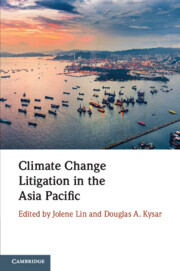Book contents
- Climate Change Litigation in the Asia Pacific
- Climate Change Litigation in the Asia Pacific
- Copyright page
- Contents
- Figures
- Tables
- Contributors
- Foreword
- Abbreviations
- Introduction
- Part I Theoretical Underpinnings and Implications of Climate Change Litigation
- Part II International Law and International Adjudication
- 3 Using Human Rights Law to Address the Impacts of Climate Change: Early Reflections on the Carbon Majors Inquiry
- 4 Litigating Human Rights Violations Related to the Adverse Effects of Climate Change in the Pacific Islands
- 5 The Potential for UNCLOS Climate Change Litigation to Achieve Effective Mitigation Outcomes
- 6 Investor-State Dispute Settlement in Renewable Energy: Friend or Foe to Climate Change?
- Part III Domestic Law and Domestic Adjudication
- Part IV China, Courts and Climate Change
- Index
6 - Investor-State Dispute Settlement in Renewable Energy: Friend or Foe to Climate Change?
from Part II - International Law and International Adjudication
Published online by Cambridge University Press: 06 November 2020
- Climate Change Litigation in the Asia Pacific
- Climate Change Litigation in the Asia Pacific
- Copyright page
- Contents
- Figures
- Tables
- Contributors
- Foreword
- Abbreviations
- Introduction
- Part I Theoretical Underpinnings and Implications of Climate Change Litigation
- Part II International Law and International Adjudication
- 3 Using Human Rights Law to Address the Impacts of Climate Change: Early Reflections on the Carbon Majors Inquiry
- 4 Litigating Human Rights Violations Related to the Adverse Effects of Climate Change in the Pacific Islands
- 5 The Potential for UNCLOS Climate Change Litigation to Achieve Effective Mitigation Outcomes
- 6 Investor-State Dispute Settlement in Renewable Energy: Friend or Foe to Climate Change?
- Part III Domestic Law and Domestic Adjudication
- Part IV China, Courts and Climate Change
- Index
Summary
The development of renewable energy is an important tool to limit greenhouse gas emissions. How the investor-state arbitration tribunals are dealing with renewable energy investment cases can influence the future growth of the renewable energy sector, creating an impact on our efforts to tackle climate change. This chapter analyses renewable energy investment cases that have arisen in Europe and North America. It considers the valuable experiences from a policy perspective which can be drawn from these cases. These cases involve application of provisions prohibiting expropriation and granting the investor fair and equitable treatment, which involve considerations of government policies. As a capital-sensitive and relatively new industry, the renewable energy sector needs government subsidies to compete with traditional fossil fuel. On the other hand, the renewable energy sector changes swiftly due to the advancement of technology, and states have found it difficult to calculate the precise level of subsidies that gives renewable energy the same level of competitiveness but without making it rely on state subsidies to make a profit. Finally, implications of these cases for climate change are analysed.
Keywords
- Type
- Chapter
- Information
- Climate Change Litigation in the Asia Pacific , pp. 144 - 172Publisher: Cambridge University PressPrint publication year: 2020
- 1
- Cited by

